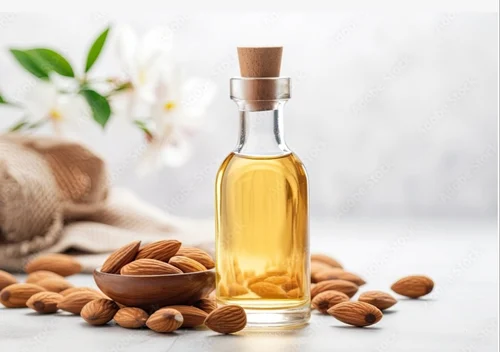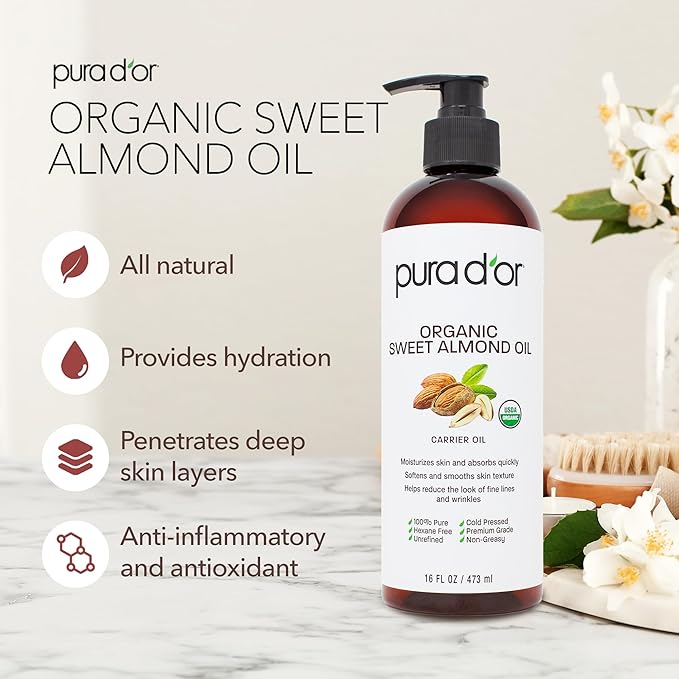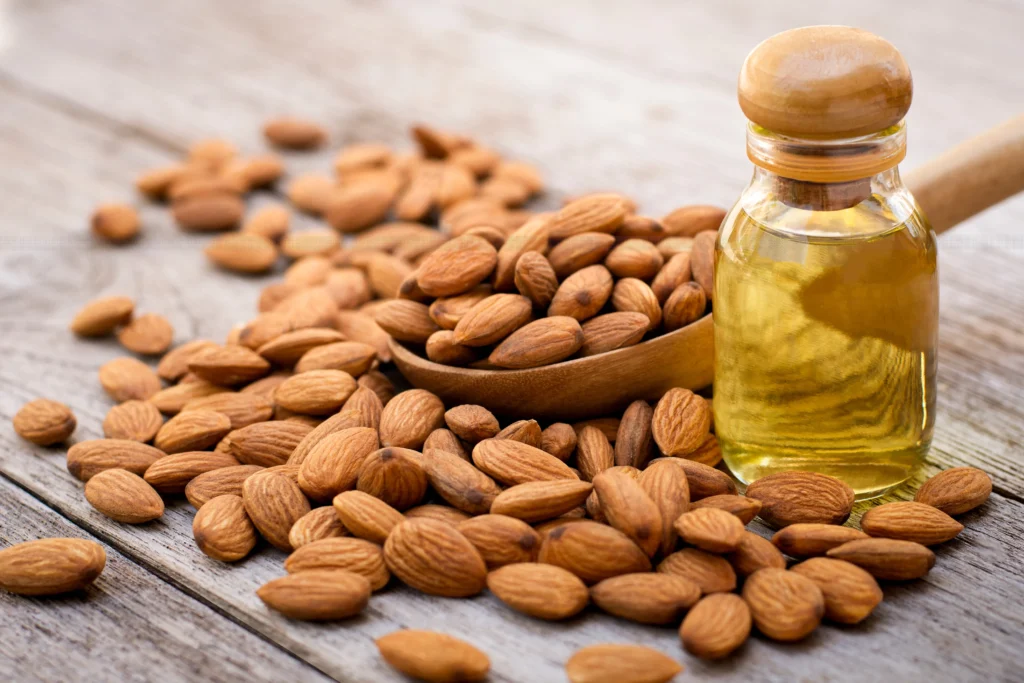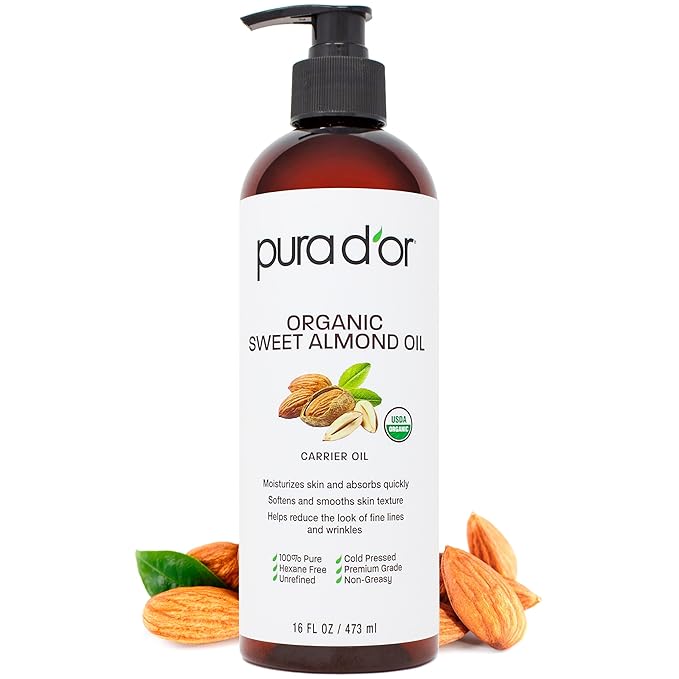PURA D’OR 16 Oz ORGANIC Sweet Almond Oil – 100% Pure & Natural USDA Certified Cold Pressed Carrier Oil For DIY Beauty – Non-Greasy, Unscented, Hexane Free Moisturizer – Massage Oil For Hair & Skin
Almond oil, derived from the kernels of sweet almonds, has been cherished for centuries as a versatile and potent natural remedy. Packed with essential nutrients, vitamins, and fatty acids, Almond Oil is a powerhouse of wellness, beauty, and health benefits. Whether applied topically, consumed, or used in aromatherapy, this golden elixir offers solutions for skin care, hair health, heart health, and more. In this detailed guide, we’ll explore the science-backed benefits of Almond OiI how to incorporate it into your daily routine, and why it deserves a permanent spot in your pantry.
1. What Makes Almond Oil So Special?
Almond Oil is extracted from the edible seeds of the almond tree (Prunus dulcis). There are two primary varieties: sweet Almond OiI (used in cosmetics and cooking) and bitter almond oiI (used in aromatherapy but toxic if ingested). The oil’s magic lies in its nutrient profile:
- Vitamin E: A powerful antioxidant that fights free radicals.
- Monounsaturated fatty acids (oleic acid): Promotes heart health.
- Polyunsaturated fatty acids (linoleic acid): Supports skin and hair.
- Minerals: Zinc, magnesium, and potassium for overall wellness.
These components work synergistically to make Almond OiI a go-to solution for holistic health.

2. Skin Benefits of Almond Oil
2.1 Deep Moisturization
Almond OiI is a natural emollient, meaning it seals moisture into the skin. Its lightweight texture makes it ideal for all skin types, including sensitive and acne-prone skin. Unlike synthetic creams, Almond Oil penetrates deeply without clogging pores, leaving skin soft and supple.
2.2 Anti-Aging Properties
Rich in antioxidants like vitamin E and retinol, Almond OiI combats wrinkles, fine lines, and sun damage. Regular application boosts collagen production, restoring elasticity and firmness. A 2019 study in Dermatology and Therapy highlighted Almond OiI’s ability to reduce UV-induced aging, making it a natural alternative to chemical-laden serums.
2.3 Treatment of Skin Conditions
Almond Oil’s anti-inflammatory properties soothe eczema, psoriasis, and dermatitis. Its high zinc content accelerates wound healing, while fatty acids repair the skin barrier. For babies, Almond OiI is a safe remedy for diaper rash and cradle cap.

3. Hair Benefits of Almond Oil
3.1 Strengthens and Nourishes
AlmondOil high magnesium content prevents hair breakage and split ends. Massaging the scalp with warm Almond Oil improves blood circulation, strengthening follicles and reducing hair fall.
3.2 Promotes Hair Growth
Biotin and vitamin E in AlmondOil stimulate dormant follicles, encouraging thicker, longer hair. A 2020 study in Journal of Cosmetic Dermatology found that participants using AlmondOil experienced a 25% increase in hair density over six months.
3.3 Fights Dandruff and Dry Scalp
The oil’s antifungal properties combat dandruff-causing microbes, while its moisturizing effects relieve dryness. Mix Almond Oil with tea tree oil for a clarifying scalp treatment.

4. Health Benefits of Almond Oil
4.1 Boosts Heart Health
Replacing saturated fats with AlmondOil lowers LDL (“bad”) cholesterol and raises HDL (“good”) cholesterol. Its oleic acid content reduces inflammation in arteries, cutting the risk of heart disease.
4.2 Regulates Blood Sugar
Almond Oil slows carbohydrate absorption, preventing blood sugar spikes. A 2017 study in Diabetes Care showed that adding AlmondOil to meals improved glycemic control in type-2 diabetics.
4.3 Enhances Brain Function
Vitamin E and omega-3s in AlmondOil protect neurons from oxidative stress, improving memory and cognitive function. Some research suggests it may reduce Alzheimer’s risk.
5. Culinary Uses of Almond Oil
Cold-pressed Almond adds a nutty flavor to salads, smoothies, and baked goods. Its high smoke point (420°F) makes it suitable for sautéing. Use sparingly, as it’s calorie-dense—1 tablespoon contains 120 calories.

6. How to Use Almond Oil
- Skin Care: Apply 2–3 drops directly or mix with lotions.
- Hair Mask: Combine with honey and yogurt for a 30-minute treatment.
- Massage: Warm Almond Oil and use for relaxing massages.
- Cooking: Drizzle over roasted veggies or blend into dressings.
7. Precautions and Side Effects
While AlmondOil is generally safe, those with nut allergies should patch-test first. Bitter almond oil contains toxic cyanide and should never be ingested. Always opt for cold-pressed organic AlmondOil for maximum benefits.
8. Conclusion
From glowing skin to a healthier heart Almond Oil is a timeless, multipurpose treasure. Its blend of vitamins, antioxidants, and fatty acids addresses modern-day health concerns naturally and effectively. By integrating AlmondOil into your skincare, haircare, and diet, you unlock centuries of wisdom in a single bottle.
